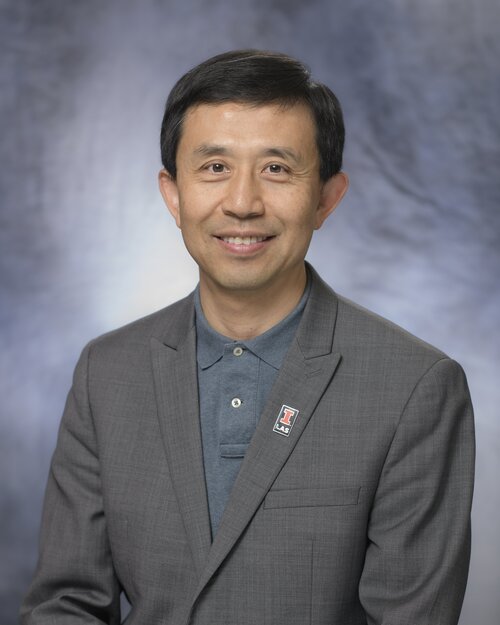
Biography
Shaowen Wang is a Professor in the Department of Geography and Geographic Information Science and the Siebel School of Computing and Data Science at the University of Illinois Urbana-Champaign. He also holds affiliate faculty appointments in the Department of Urban and Regional Planning and the School of Information Sciences. He currently serves as Associate Dean for Natural and Mathematical Sciences in the College of Liberal Arts and Sciences and as a Senior Faculty Fellow in the Office of the Vice Chancellor for Research and Innovation. He is the founding director of the CyberGIS Center for Advanced Digital and Spatial Studies and leads the national Institute for Geospatial Understanding through an Integrative Discovery Environment (I-GUIDE) funded by the National Science Foundation. He previously served as Head of the Department of Geography and Geographic Information Science (2017-2023) and as Associate Director of the National Center for Supercomputing Applications for CyberGIS (2010-2017). He was a Visiting Scholar at Lund University (2006) and Harvard University (2023). His research focuses on advancing cyberGIS, geospatial data science, and spatial artificial intelligence (AI) to develop scalable solutions for complex geospatial problems and sustainability challenges. He served as President of the University Consortium for Geographic Information Science (UCGIS) from 2016 to 2017 and as a member of the National Academies’ Board on Earth Sciences and Resources from 2015 to 2020. He is a Fellow of the American Association for the Advancement of Science (AAAS), the American Association of Geographers (AAG), and UCGIS.
Education
- PhD, Geography, the University of Iowa
- Master of Computer Science, the University of Iowa
- MS, Geography, Peking University
- BS, Computer Engineering, Tianjin University
Courses Taught
- Coursera: Getting Started with CyberGIS
- GGIS 595 - Advanced Digital and Spatial Studies
- GGIS 480 - Principles of GIS
- GGIS 479 - Advanced GIS
- GGIS 407 - Foundations of CyberGIS and Geospatial Data Science
- GGIS 379 - Introduction to GIS
Additional Campus Affiliations
Associate Dean, College of Liberal Arts and Sciences
Professor, Geography and Geographic Information Science
Professor, School of Information Sciences
Professor, Siebel School of Computing and Data Science
Senior Faculty Fellow, Office of the Vice Chancellor for Research and Innovation
Affiliate, Social & Behavioral Sciences Institute
External Links
Recent Publications
Chan, M. P. S., Fayaz-Farkhad, B., Han, S. Y., Park, J., Wang, S., & Albarracin, D. (2025). Ending the HIV Epidemic: Development and Evaluation of CyberGIS-HIV, a Web-Based Prediction Application. American journal of public health, 115(10), 1589-1593. https://doi.org/10.2105/AJPH.2025.308194
Choi, Y. D., Maghami, I., Goodall, J. L., Band, L., Nassar, A., Lin, L., Saby, L., Li, Z., Wang, S., Calloway, C., Yi, H., Seul, M., Ames, D. P., & Tarboton, D. G. (2025). Toward reproducible and interoperable environmental modeling: Integration of HydroShare with server-side methods for exposing large-extent spatial datasets to models. Environmental Modelling and Software, 183, Article 106239. https://doi.org/10.1016/j.envsoft.2024.106239
Han, S. Y., Yoo, J., Michels, A., Kang, J. Y., Wang, S., & Kim, J. S. (2025). Vulnerable Neighborhood Explorer (VNE): An Open-Source Visual Analytics Tool for Exploring Social Vulnerability to Disasters across Different Neighborhoods. SoftwareX, 31, Article 102233. https://doi.org/10.1016/j.softx.2025.102233
Islam, M. S., Azaz, T., Ahmad, R., Shahadat Hossain, A. S. M., Baig, F., Wang, S., Lannon, K., Malik, T., & Thain, D. (2025). Backpacks for Notebooks: Enabling Containerized Notebook Workflows in Distributed Environments. In Proceedings - 2025 IEEE International Conference on e-Science, eScience 2025 (pp. 169-177). (Proceedings - 2025 IEEE International Conference on e-Science, eScience 2025). Institute of Electrical and Electronics Engineers Inc.. https://doi.org/10.1109/eScience65000.2025.00028
Li, Z., Ning, H., Gao, S., Janowicz, K., Li, W., Arundel, S. T., Yang, C., Bhaduri, B., Wang, S., Zhu, A. X., Gahegan, M., Shekhar, S., Ye, X., McKenzie, G., Cervone, G., & Hodgson, M. E. (2025). GIScience in the era of Artificial Intelligence: a research agenda towards Autonomous GIS. Annals of GIS, 31(4), 501-536. https://doi.org/10.1080/19475683.2025.2552161